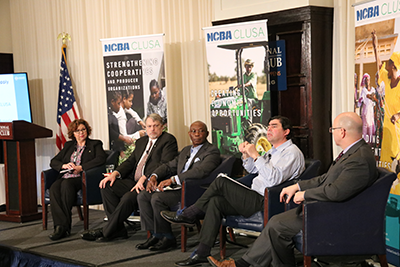
Bringing together government partners, international development organizations and the private sector, nearly 100 attendees discussed how cooperatives can be a foundation for developing sustainable supply chains as part of the launch of NCBA CLUSA’s new USAID-funded Cooperative Development Program at the National Press Club last week.
Representing a broad range of partners, the panel included leaders from the International Finance Corporation (a part of the World Bank), Fairtrade America and McCormick & Company. Framed by the launch of NCBA CLUSA’s new USAID Project, Creating an Environment for Cooperative Expansion, the presentations and discussion centered around how co-ops can be the link between creating sustainable communities and stable supply chains.
“We think of our four stakeholders: communities, customers, consumers and the company,” said Michael Okoroafor, Vice President of Global Packaging and Sustainability at McCormick. “For us, the most important is the farming community, the smallholders that we work with.”
Supporting those smallholder farmers through education, training, coaching and capacity building in management, governance and other business topics not only supports quality commodities and supply chains, but also promotes professionalization and a sense of ownership among farmers and supports the communities where those farmers live. Education and training through cooperatives is providing farmers with the tools to practice climate-smart agriculture and the structure to invest in their communities through social programs.
“Cooperatives are at the heart of what we do,” said Hans Theyer, Executive Director of Fairtrade America. Co-ops are half of all representation at Fairtrade, he added. With the Fairtrade premiums, cooperatives are re-investing in their communities.
And professionalization is key to building up the capacity of smallholder farmers to support global supply chains and combat climate change at the local level. Dieter Fischer, Lead for Agribusiness Advisory Services in Latin America and the Caribbean for IFC, outlined how IFC is developing tools to support these efforts, including the launch of the “Working with Smallholders” handbook, which occurred the day before the panel and also featured a discussion with NCBA CLUSA’s Director of Cooperative Development Rebecca Savoie.
As a founding member of the Agribusiness Market Ecosystem Alliance (AMEA), NCBA CLUSA has been working with the alliance and the IFC to develop and implement tools for training and professionalization.
Given the successes and challenges of working with cooperatives to develop sustainable supply chains, Savoie outlined three areas of focus for the new USAID project, including working to support enabling environments at the federal level, working with support institutions and associations and working directly with co-ops on building up member equity.
Will Bullock, NCBA CLUSA’s Director of Creating Economic Opportunity also outlined how successes like NCBA CLUSA’s partnerships in Southeast Asia and Madagascar occurred through years of partnership, trust developed through relationship building and investment from the private sector.
The USAID Cooperative Development Program Creating an Environment for Cooperative Expansion will run for five years though 2023 and will focus on five countries: Guatemala, Peru, Kenya, Tanzania and Madagascar.
A full video of the panel and discussion is available below.


